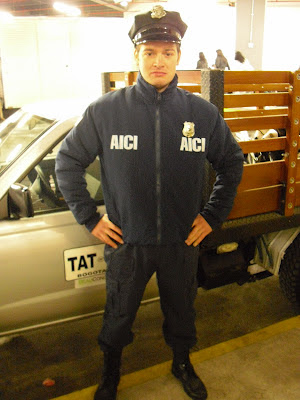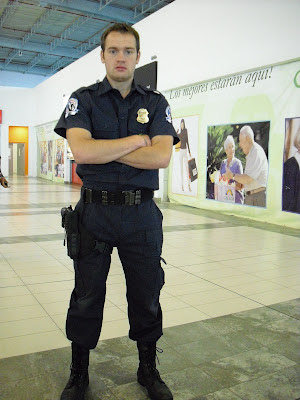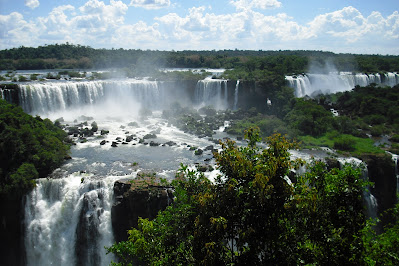We witnessed a rare occurrence here in
Bogotá the other day. It was certainly something far from uncommon for us but
for this city, indeed Colombia in general, it was an event you don’t see
everyday.
No, don’t be silly now, it wasn’t one of the locals admitting he/she
was at fault or being totally honest about something. We don’t expect to see
such happenings anytime soon.
What did catch our eye, though, was a good old-fashioned bar brawl amongst a number of natives. Somebody said something they shouldn’t have – or at least that’s what some of the people that heard it thought – and next we had about half a dozen lads exchanging blows.
 |
| Drunken Colombian fun without the fights — well, until the Irish lad arrived that is. |
What did catch our eye, though, was a good old-fashioned bar brawl amongst a number of natives. Somebody said something they shouldn’t have – or at least that’s what some of the people that heard it thought – and next we had about half a dozen lads exchanging blows.
Fair
enough, what transpired wasn’t of the highest calibre, but it was sufficient
enough to make memories of home come flooding back.
We have to admit, we got a strange
warm feeling from being a live spectator. Growing up or, more pertinently, socialising in Ireland has seen us become accustomed to regular, drunken
punch-ups.
Instead of some salted peanuts or a similar style snack accompanying
your beverage, as is the case in many countries, back in the homeland you get
free, front-row seats to bare knuckle boxing. Indeed, if you’re lucky enough,
you might even get to take part.
Alas, here in "Dangerous" Colombia, you’ll be
hard pressed to find such riveting entertainment on a night out.
You see unlike
the Irish, as well as the Brits and the Aussies (we can throw in a few more nations here, too, such as Poland and some other eastern European countries) the
addition of alcohol into most Colombians' systems – and Latinos in general –
doesn’t usually result in an overly aggressive streak developing.
 |
| Why fight when you can, er, 'dance' instead? |
It’s not that
they don’t get drunk, they certainly do, but alcohol tends to transform them
less into Incredible Hulks and more into Snow Whites. It’s probably because
they’re too caught up in dancing than to think about engaging in a scuffle with
the other half-wit at the next table.
The bottom line here is that you are more likely to find yourself in an A&E department with a brawl-related injury after a night out in Britain or Ireland than you are in these parts. But which place is seen as less safe?
Of course, people will point to muggings and other such "petty" crime as being far more prevalent in Colombia compared to most Western countries. Yes, they happen.
In fact, we were unlucky
enough to be the victims of a knife attack in Bogotá recently – our first
such experience in South America it must be added.
Such things, though, come with
the territory in most big cities across the globe, wherever they’re located.
What’s more, a lot of the time here in Colombia, these unsavoury incidents are
utter opportunism by the perpetrators, pure and simple.
From our experiences, there lacks an
in-built thuggish nature that you find in many of the lowlifes from the
countries we were brought up in and know best.
As a good Italian friend mused about his experience living in Manchester, many of the locals there just seemed to have a desire to fight all the time. No matter how much you keep yourself to yourself , you’ll invariably find trouble in such places – or trouble will find you, to be more accurate.
For many of the boys from these more "developed" locations, a night out just wouldn’t be complete without a bit of a fisticuff. A lot of the time it’s a mentality that exists in sobriety, so throw in a cocktail of drink and drugs and you could be, quite literally, on a hiding to nothing.
As a good Italian friend mused about his experience living in Manchester, many of the locals there just seemed to have a desire to fight all the time. No matter how much you keep yourself to yourself , you’ll invariably find trouble in such places – or trouble will find you, to be more accurate.
For many of the boys from these more "developed" locations, a night out just wouldn’t be complete without a bit of a fisticuff. A lot of the time it’s a mentality that exists in sobriety, so throw in a cocktail of drink and drugs and you could be, quite literally, on a hiding to nothing.
 |
| Oh Venezuela, how we miss you & your quirky ways. |
In any case as our "Dangerous" Colombia series has hopefully shown, how dodgy a place is depends very much on how you look at it.
As with everything, it’s relative. Colombia’s negative reputation certainly precedes it, but there are worse places you could be. For one, it’s no Venezuela.
__________________
For
the related articles see: http://bit.ly/Je5pxC & http://bit.ly/K57gG5







